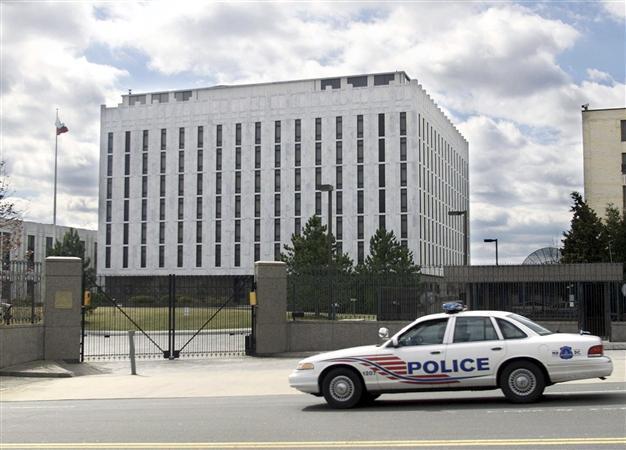US charges Russian diplomats over $1.5 million fraud
NEW YORK - Agence France-Presse

A police vehicle drives past in front of the Russian Embassy in Washington in this March 22, 2001 file photo. U.S. prosecutors have charged 49 current and former Russian diplomats and their family members with participating in a scheme to get health benefits intended for the poor by lying about their income. REUTERS photo
The United States has charged 49 current and former Russian diplomats and their wives over a "shameful" $1.5 million fraud, accusing them of stealing New York medical benefits for a decade.The alleged scam took place between 2004 and August 2013, when the suspects were based at the Russian mission to the United Nations, the Russian consulate and the Russian trade mission.
They are accused of lying about their true income to claim the benefits while splurging on tens of thousands of dollars worth of products in designer shops such as Tiffany & Co., Jimmy Choo and Prada.
Prosecutors also say the group plotted to obtain almost $500,000 in benefits from a program earmarked for low-income American families when their children were born in the United States.
A total of $1.5 million in benefits was illegally obtained by the Russians and dozens of other co-conspirators, who were not named in the complaint.
All the defendants have diplomatic immunity and none have been arrested following an FBI investigation. Neither the Russian consulate nor the Russian mission to the United Nations were immediately available for comment.
Manhattan U.S. Attorney Preet Bharara denounced the "shameful and systemic corruption" among Russian diplomats who had scammed a health care system designed to help Americans in need.
"Diplomacy should be about extending hands, not picking pockets in the host country," he said.
The federally funded Medicaid program grants prenatal and childbirth care to low-income families, regardless of nationality, on the grounds that the child will be born a U.S. citizen.
Eleven still live in US
The newborn child is entitled to benefits until its first birthday. Diplomats and their families are not ordinarily entitled to benefits under the program unless in an emergency.
The defendants' true income was often hundreds, if not thousands of dollars a month more than they falsely reported, and twice lied that their child was a U.S. citizen, prosecutors said.
Russian government letters signed by officials at the three missions falsely confirmed the fake incomes, they added.
Russian diplomats do not pay U.S. taxes. They live mostly in homes paid for by the Russian government and Moscow has historically paid their medical expenses.
One couple purportedly collected almost $3,000 in benefits by claiming they made only $3,200 a month when in fact the husband was paid an average of around $8,000 a month.
Of the 49 defendants, 25 are or were accredited diplomats and 24 were their wives. Eleven are still living in the United States.
Five work at the Russian mission to the United Nations, five are their spouses and one is employed at the Russian Embassy in Washington after serving at the consulate in New York.
The luxury items the diplomats are accused of buying with the illegally obtained funds include cruises and trips to the Caribbean, watches, shoes and jewelry.
Case won't hurt relations: State Department
While the U.S. State Department can request a waiver of immunity or ask individuals to leave the country, a spokeswoman told reporters she had no details on discussions about the case.
"We are still, at the State Department, reviewing the charges that were unsealed," said deputy spokeswoman Marie Harf.
"We're not yet in a position to speak to the types of specifics about what might happen. Obviously, there is a legal procedure that will be unfolding from this point." Harf said the case was unlikely to affect Washington's relationship with Moscow, which can be testy at best.
"Quite frankly, there are too many important issues we have to work on together," she said.
"The justice system will proceed in the way that it does here in the States and we don't think it should impact our relationship." Russian-US ties have dramatically deteriorated in the last year over a host of issues, including the Syrian civil war and human rights.
Tensions reached a peak this summer after Moscow gave asylum to the US intelligence leaker Edward Snowden, prompting U.S. President Barack Obama to scrap a planned visit to Moscow ahead of the G20.
















